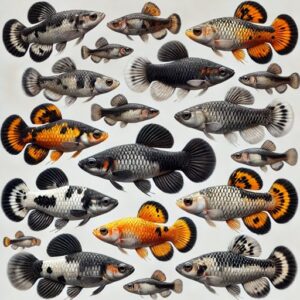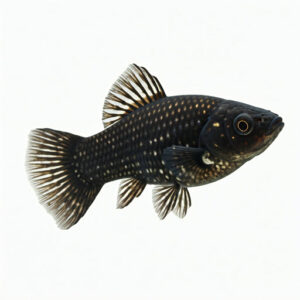
Mollies for Aquaponics: Why They’re a Top Choice for Sustainable Fish Farming
Aquaponics is revolutionizing how we grow plants and raise fish in a symbiotic system, and choosing the right fish is critical for success. One of the top 25 fish species for aquaponics is the Molly. These small, hardy, and low-maintenance fish are ideal for both beginners and advanced aquaponic farmers looking to optimize their system’s efficiency.
In this article, we’ll explore why Mollies stand out, their care requirements, and how they contribute to a healthy aquaponic ecosystem.
Why Mollies in Aquaponics Are Perfect for Aquaponics
Mollies have several traits that make them ideal for aquaponics:
- Hardy and Adaptable: Mollies can thrive in a variety of water conditions, including slight changes in temperature and pH levels.
- High Nutrient Output: Their waste is nitrogen-rich, providing plants with the nutrients they need for robust growth.
- Small Size: Mollies are compact, making them perfect for smaller systems or setups with limited space.
- Easy to Breed: Mollies reproduce quickly, providing a consistent population for your system.
These benefits make Mollies a top pick for aquaponics enthusiasts who want sustainable and low-maintenance fish.
Key Mollies’ Requirements for Aquaponics Systems
To ensure success, it’s essential to meet the basic needs of Mollies in your aquaponics system:
- Growth Rate
-
- Mollies are relatively fast growers, reaching maturity in 4-6 months.
- Their adult size typically ranges between 3 to 5 inches, depending on water quality and diet.
- Temperature Tolerance
-
- Mollies prefer water temperatures between 72-82°F (22-28°C).
- They can tolerate slight fluctuations, but consistent temperatures ensure better health and reproduction rates.
- pH Tolerance
-
- Mollies thrive in slightly alkaline water, with an ideal pH range of 7.0-8.0.
- Maintaining stable pH levels helps them stay disease-resistant and stress-free.
- Disease Resistance
-
- Mollies are hardy but can suffer from diseases like ich if water quality deteriorates.
- Prevent disease by maintaining clean water, regular water changes, and using natural biofilters.
- Oxygen Requirements
-
- Mollies require moderate aeration. Ensure adequate oxygen using air stones, pumps, or diffusers.
- Proper oxygen levels keep both the fish and plants thriving.
Stocking Density for Mollies in Aquaponics
The ideal stocking density for Mollies is 1 fish per 5-10 gallons of water. This balance prevents overcrowding, minimizes stress, and ensures the bio-load remains manageable for your plants and filtration system.
For smaller aquaponic systems, Mollies are especially suitable because their size and waste production align well with compact setups.
Feed Conversion Ratio (FCR) and Diet
Mollies are efficient eaters with a good Feed Conversion Ratio. They thrive on a varied diet, including:
- Commercial fish pellets designed for small fish.
- Algae and plant matter naturally found in aquaponic systems.
- Vegetable scraps such as spinach or zucchini.
Providing a balanced diet enhances their nutrient output, benefiting the plants in your aquaponic system.
Breeding Mollies in Aquaponics for a Sustainable Population
Mollies are livebearers, meaning they give birth to live young instead of laying eggs. This makes breeding incredibly easy and efficient.
- A single female Molly can give birth to 20-100 fry every 4-6 weeks.
- Separate breeding nets or tanks help protect fry from larger fish.
- Within a few months, the fry will grow to full size and contribute to the aquaponic system.
This continuous breeding ensures a sustainable and self-sufficient fish population.
Compatibility with Other Aquaponic Fish
Mollies are peaceful fish and can easily coexist with other species such as:
- Guppies
- Tilapia Fry
- Goldfish
Avoid aggressive or territorial fish, as Mollies may become stressed in competitive environments.
Nutrient Output for Plants
One of the most significant benefits of Mollies is their nutrient-rich waste. Their waste contains essential nitrates, which are perfect for growing:
- Leafy greens like lettuce and spinach.
- Herbs such as basil and mint.
- Fruiting plants like strawberries and tomatoes.
Their consistent waste production supports healthy and vigorous plant growth, making them valuable contributors to the aquaponic ecosystem.
Hardiness and Water Quality Tolerance
Mollies in Aquaponics are forgiving fish when it comes to water conditions. They can adapt to slight changes in:
- pH levels
- Temperature
- Oxygen levels
However, maintaining high water quality through proper filtration and regular monitoring will ensure their longevity and health.
Size and Time to Harvest
While Mollies are not typically raised for consumption due to their small size (3-5 inches), they play a critical role in maintaining the aquaponic system. Their quick growth and consistent breeding make them ideal for:
- System maintenance
- Nutrient cycling
- Population control in balanced ecosystems.
Suggested Products for Mollies-Based Aquaponics
- Indoor Aquaponic Garden – 3 Gallon Self Watering, Mess-Free Planter
- 3-Gallon Aquaponic Fish Tank
- Fish Food Black Mosquito Larvae: Supplement – natural feeds. (special treat for your Mollies)
- Freeze Dried Brine Shrimp Supplement – natural feeds. (special treat for your Mollies)
- Water Testing Kits: Regular monitoring of pH, ammonia, and nitrate levels is essential.
- Aerators: Reliable aeration systems to maintain oxygen levels.
- Spawning mops – Floating – for sustainable fish populations.
- Spawning mops – Sinking – for sustainable fish populations.
Transform your aquaponics system with Mollies today!
Download our free
Ultimate Guide To Aquaponics
Cultivating Sustainable Food Systems at Home
Ready to Start with Mollies?
Are you looking for an easy-to-manage fish that boosts your aquaponic system’s efficiency? Mollies are the perfect choice! Their hardiness, nutrient output, and breeding capabilities make them ideal for both beginners and experienced aquaponics farmers.
Conclusion
Mollies are undoubtedly one of the best fish species for aquaponics systems. Their adaptability, nutrient output, and ease of care make them a valuable addition to any setup. Whether you’re growing leafy greens or herbs, Mollies will help you achieve healthier plants and a balanced ecosystem.
Start your aquaponics journey with Mollies today and enjoy the benefits of sustainable farming!
Mollies Scorecard.

Fish Name: Mollies
| Criteria | Score (1-5) | Notes |
|---|---|---|
| Growth Rate | 3 | Moderate growth rate, suitable for ornamental purposes. |
| Temperature Tolerance | 4 | Tolerates a wide range of temperatures, thrives in warm water. |
| pH Tolerance | 4 | Can adapt to brackish or slightly alkaline water. |
| Disease Resistance | 3 | Moderate disease resistance but can be prone to ich in poor water. |
| Oxygen Requirements | 3 | Moderate oxygen needs. |
| Stocking Density | 4 | High stocking density possible in smaller systems. |
| Feed Conversion Ratio | 3 | Average feed efficiency. |
| Market Value | 3 | Popular in the ornamental fish trade. |
| Ease of Breeding | 5 | Extremely easy to breed, livebearers. |
| Compatibility with Other Species | 4 | Compatible with other community fish. |
| Nutrient Output for Plants | 3 | Moderate nutrient production for aquaponics. |
| Hardiness | 4 | Adaptable and hardy with proper care. |
| Water Quality Tolerance | 4 | Tolerant of varied water conditions. |
| Size at Harvest | 2 | Small; not typically used for food production. |
| Time to Harvest | 3 | Reaches adult size within 3–6 months. |
Overall Score: 52
Pros:
• Very easy to breed.
• Highly adaptable to water conditions.
•Compatible with other species.
Cons:
• Limited to ornamental purposes.
• Moderate susceptibility to disease.
Best Suited For:
• Small-scale aquaponics or decorative aquariums.
Additional Notes:
Perfect for beginners; hardy and productive in community aquaponics setups.








